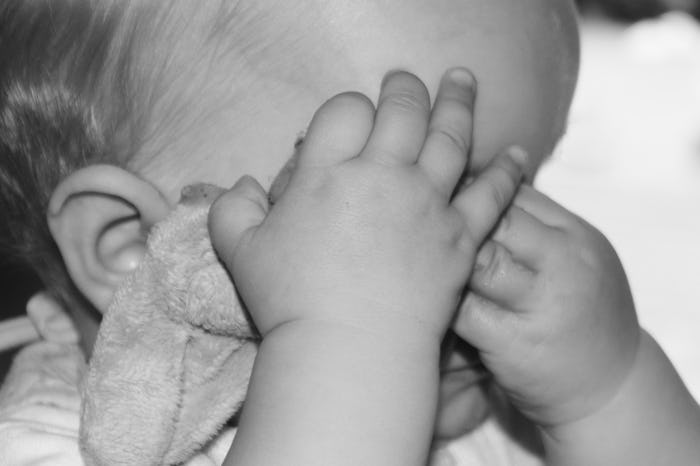Life
7 Things A Sleep Expert Wants You To Know About Sleep Regressions
You think you are in the clear. Your kiddo has been sleeping through the night for several weeks, and you have finally started to feel like yourself again. Then, suddenly, the night wakings begin again. To top it off, your kid has started to fight naps and bedtime too. Although it may feel like it, your baby is not actually out to hurt you. This is what is known as a sleep regression. For a lot of parents, it comes as a surprise, so there are things a sleep expert wants you to know about sleep regressions to help you survive this tough time.
In a recent interview with Nicole Johnson— a baby sleep coach, owner of The Baby Sleep Site, and a mother of two boys — I learned that almost all parents have had to deal with sleep regressions at some point. It's not a fun time, to say the least, but parents all over the world (myself included) have lived to tell the tale. With a little patience and persistence, you can be one of the mighty survivors, as well.
Here is some information about sleep regression that Johnson and a few other sleep experts really want you to know to help you get through this dreaded stage.
1Sleep Regressions Can Happen More Than Once
According to Johnson, sleep regressions are common in babies at four to six months, eight to 10 months, and toddlers at around 18 months and two years.
2It's A Period Of Development
Why do babies and toddlers go through sleep regressions? Johnson tells me that regressions are really a period of child development during which their sleep is impacted. Babies are learning to sit up, crawl, and talk and this keeps their minds busy during the time they should be settling down for sleep. They may even be practicing these new skills instead of falling asleep. "The bigger the skill or the more skills they are learning at once tend to be the periods where sleep is most impacted," says Johnson.
Toddlers also tend to test limits and try to gain independence during this time, and sometimes go through a period of separation anxiety. It's all part of the developmental process.
3Consistency Is Key
Johnson notes that it is important for you to remain somewhat consistent in your routines to help your baby or toddler feel more secure in their world. "So much is changing within them that it will help to keep certain daily routines the same, so they can feel safe and secure," she says. Keep bedtime routines and sleep schedules consistent to help your little one fall back into a routine as soon as possible.
4There Might Be An Underlying Cause
Most sleep regressions seem to happen with no discernible cause, but sometimes, a child's growth and development happens faster than parents are prepared for. One thing that can be keeping toddlers awake is hunger. Johnson recommends that parents make sure they are feeding their toddlers adequate amounts of food based on their activity levels.
5Don't Create Sleep Crutches
Johnson warns to avoid putting your child to bed with too many sleep crutches. Kim West, author of The Sleep Lady's Good Night, Sleep Tight told Parents that a sleep crutch is when something is so linked to sleep in the child's mind that he cannot drift off without them. Introducing (or re-introducing) behaviors such as rocking, nursing, walking, swinging, singing, and back rubbing can create a habit that is hard to break.
Dr. Jose Colón, a physician dual board-certified in sleep medicine and neurology, sleep expert and founder of Paradise Sleep advised putting an emphasis on sleep association with items that will be there when the child awakens (crib, lovey), rather than on a behavior the child needs the parent for (rocking or nursing). Johnson recommends encouraging your child to fall asleep independently.
6Don't Go Overboard
According to Johnson, parents should avoid panicking and going overboard with how they handle these temporary sleep setbacks. Changing all of your sleep routines for a regression that may only last a couple of weeks, can actually extend it by months.
7It's Only Temporary
The good news is that, although every child is different, most sleep regressions only last three to six weeks on average, according to Johnson. This may seem like an eternity while you're in the thick of it, but it's just a short amount of time when you consider all of the lifelong skills your baby is developing.
